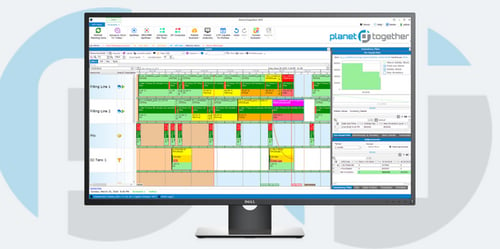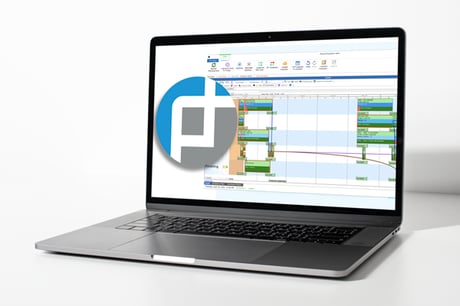Prioritizing Sustainability and Carbon Neutrality in Industrial Manufacturing: The Role of PlanetTogether and Enterprise System Integration
Sustainability and carbon neutrality are no longer just industry buzzwords—they are essential priorities for industrial manufacturers looking to stay competitive in an evolving regulatory and consumer landscape. As global pressures for sustainable operations intensify, companies must implement solutions that reduce their carbon footprint while maintaining efficiency, productivity, and profitability.
For Manufacturing IT Managers, the challenge lies in integrating sustainability initiatives with existing enterprise systems like SAP, Oracle, Microsoft, Kinaxis, and Aveva. One of the most effective ways to achieve this is through advanced production scheduling software like PlanetTogether, which, when integrated with enterprise resource planning (ERP) and supply chain management (SCM) solutions, can optimize resource use, minimize waste, and enhance operational efficiency.

The Growing Need for Sustainable Manufacturing
Industrial manufacturing is one of the largest contributors to global carbon emissions. From raw material extraction to production and distribution, every step in the supply chain has an environmental impact. Many manufacturers are now prioritizing carbon neutrality due to:
Regulatory Compliance: Governments worldwide are enforcing stricter emissions regulations, requiring manufacturers to implement sustainable practices.
Consumer Demand: Increasing consumer preference for environmentally friendly products is pushing companies to adopt greener manufacturing methods.
Cost Savings: Sustainability initiatives, such as energy efficiency and waste reduction, lead to cost savings in the long run.
Competitive Advantage: Companies with strong sustainability commitments attract investors and business partners who prioritize Environmental, Social, and Governance (ESG) criteria.

How PlanetTogether Supports Sustainable Manufacturing
PlanetTogether’s Advanced Planning and Scheduling (APS) system is a game-changer for industrial manufacturers aiming for sustainability. Here’s how it contributes to carbon neutrality:
Optimized Production Scheduling for Energy Efficiency
PlanetTogether enables manufacturers to align production schedules with off-peak energy hours, reducing electricity costs and the reliance on fossil-fuel-powered grids. When integrated with ERP systems like SAP or Oracle, it provides real-time data on machine usage and energy consumption, allowing IT teams to fine-tune production plans for energy savings.
Reduction of Material Waste
By integrating with SCM solutions such as Kinaxis or Aveva, PlanetTogether helps optimize material flow, reducing scrap and rework. Accurate forecasting and demand planning minimize excess production, ensuring that raw materials are used efficiently.
Carbon Footprint Tracking and Reporting
Sustainability initiatives must be measurable to be effective. When integrated with enterprise systems, PlanetTogether can provide real-time tracking of CO2 emissions, helping Manufacturing IT Managers generate reports for regulatory compliance and sustainability reporting.
Intelligent Resource Allocation
PlanetTogether’s AI-driven scheduling capabilities enable manufacturers to maximize the use of energy-efficient equipment, avoid bottlenecks, and reduce idle times. Integration with Microsoft Dynamics 365 allows seamless data exchange, ensuring the most sustainable use of factory resources.
Supply Chain Optimization
A sustainable supply chain starts with intelligent planning. Integrating PlanetTogether with Kinaxis or Aveva allows IT managers to analyze transportation routes, supplier emissions, and logistics efficiencies. This results in smarter sourcing decisions and reduced transportation-related carbon emissions.

Integrating PlanetTogether with ERP and SCM for Maximum Impact
To fully leverage the sustainability benefits of PlanetTogether, it must be seamlessly integrated with existing enterprise systems. Here’s how integration with major platforms enhances sustainability efforts:
SAP Integration: Driving Energy-Efficient Manufacturing
When integrated with SAP S/4HANA, PlanetTogether enables manufacturers to monitor energy consumption in real time. SAP’s Sustainability Control Tower can use this data to provide actionable insights, helping manufacturers align with carbon neutrality goals.
Oracle Integration: Enhancing Green Supply Chain Management
Oracle Cloud SCM’s powerful analytics combined with PlanetTogether’s scheduling capabilities ensure that manufacturers minimize waste and energy consumption. The integration facilitates predictive maintenance, reducing unplanned downtime and improving asset longevity.
Microsoft Integration: Leveraging IoT for Smart Manufacturing
With Microsoft Azure and Dynamics 365, IT managers can integrate IoT-enabled sensors to collect data on energy use, machine efficiency, and emissions. PlanetTogether utilizes this data to optimize schedules, ensuring minimal environmental impact.
Kinaxis Integration: Streamlining Sustainable Supply Chains
Kinaxis RapidResponse, when paired with PlanetTogether, provides real-time supply chain visibility. IT managers can assess sustainability KPIs such as CO2 emissions per shipment and adjust production schedules accordingly.
Aveva Integration: Advancing Industrial Sustainability
Aveva’s digital twin technology and PlanetTogether’s scheduling tools work together to simulate various production scenarios, identifying the most sustainable approach before implementation.
Implementation Challenges and Best Practices
While integrating PlanetTogether with enterprise systems offers significant sustainability benefits, Manufacturing IT Managers must navigate some challenges:
Data Silos: Ensure seamless data flow between systems by utilizing middleware or APIs.
Change Management: Train staff and gain executive buy-in to align technology adoption with sustainability goals.
Real-Time Data Accuracy: Invest in IoT and cloud solutions to maintain real-time data integrity.
Scalability: Choose flexible solutions that can scale as sustainability goals evolve.
Prioritizing sustainability and carbon neutrality in industrial manufacturing is no longer optional—it is a duty. Manufacturing IT Managers play a crucial role in ensuring that sustainability initiatives are data-driven, measurable, and seamlessly integrated into enterprise systems.
By leveraging PlanetTogether APS alongside SAP, Oracle, Microsoft, Kinaxis, or Aveva, manufacturers can significantly reduce their carbon footprint while optimizing production efficiency. The future of manufacturing is green, and technology is the key to making that future a reality.
Are you ready to integrate sustainability into your manufacturing operations? Contact us today to learn more about how PlanetTogether can drive energy efficiency and carbon neutrality across your production environment.
Topics: Industrial Manufacturing, Supply Chain Optimization, PlanetTogether Software, Integrating PlanetTogether, Optimized Production Scheduling, Carbon Footprint Tracking and Reporting, Intelligent Resource Allocation, Reduction of Material Waste





















LEAVE A COMMENT